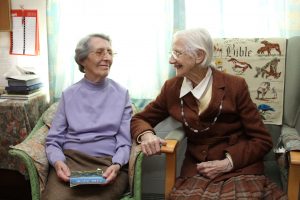How would you suppose that God could use an elderly woman dying of cancer in the UK, a woman in her 70s living with dementia in a retirement village and dispossessed grandmothers in Zimbabwe to impact the lives of thousands of others?

The elderly lady was Mrs Bullen. She was the last of her family, living alone in a small flat where she was visited regularly by two ‘gangly, spotty, 18-year-olds’. They were friends studying medicine at University and had signed up as volunteers with a befriending charity. One of them was Max Pemberton, now a practising psychiatrist who also writes a regular newspaper column.
He remembers that when they visited Mrs Bullen, ‘she always listened and gave sage advice, made us cups of tea and, at the end of our visit, would give us plastic bags crammed full of goodies to keep us going.’ Although they’d become volunteers with the intention of helping someone, they found Mrs Bullen was helping them. She taught them so much about life and death. She had terminal cancer, and the matter-of-fact way she approached her death had such a profound influence on his friend that now, 20 years later, he is a consultant in community geriatrics. (Daily Mail, Sep 2019) Thousands of older people have benefited by his skills and compassion, and those of his psychiatrist friend.
And who would could possibly see how God could use a 70-plus year-old living with dementia in a retirement village? Jennifer Bute was a senior family doctor and a Fellow of the Royal College who retired early when she developed dementia. She had worked in a hospital in Africa and she and her husband had planned to work there as missionaries after she’d retired, but when dementia impacted her life, they had to put aside their plans.
Yet God’s plan for Jennifer was far from finished. He showed her how, with her background and experience, she could help others. With her son’s help, she shares unique insights on a website (www.gloriousopportunity.org). She also produces leaflets, and in the retirement village where she lives, runs two cognitive stimulation classes a week based on the work of a Japanese neuroscientist who she met at a conference in London. Last year, a book I wrote with Jennifer called ‘Dementia from the Inside: A Doctor’s Personal Journey of Hope’ was published (SPCK). In less than three months it was reprinted three times.

The story of the grandmothers in Zimbabwe began in 2005 when 700,000 Zimbabweans were made homeless. Their homes in the Harare slums had been bulldozed after their residents had voted for the opposition, leaving them traumatised. A Zimbabwean psychiatrist, Dr Dixon Chibanda, wanted to help them but, as one of only a handful of psychiatrists in the country, he had no resources. He pondered on what sort of people could be enlisted to help, who had the personal attributes for the role, and he hit on the idea of grandmothers. They had listening skills and patience and he decided he could train them in cognitive-behavioural therapy. The training he devised takes two weeks instead of the several years needed to qualify as a conventional psychotherapist.
Dr Chibanda encouraged the grandmothers to wait on ‘Friendship benches’ in health centres and community centres, offering counselling help to anyone suffering from anxiety or depression. A 2015 report found far fewer of those they’d helped still had mental health issues compared with those who had received conventional treatment. Also, as part of the solution the grandmothers have purpose in their lives and are less likely to suffer from depression themselves. The model has since spread to post-conflict areas, and to cities such as New York.
Far too often older people believe they are of no use to God, because their years of ‘doing’ have passed. These are just three examples of God’s plan, showing how He hones our characters through our lives so that, in our later years of ‘being’ (and not doing) He can minister to others through us, just by our being ourselves. It’s completely missed by today’s modern, all-is-disposable thinking that sees life in a U-curve from infancy to a peak in adulthood then down and out in old age. 1 Corinthians 3:19 captures it well, when it says, ‘For the wisdom of this world is foolishness in God’s sight.’















